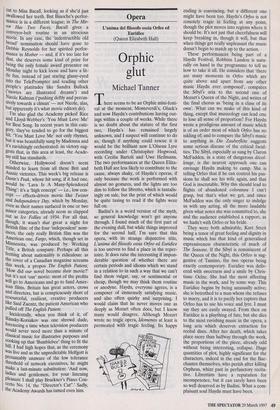Opera
L'anima del filosofo ossia Orfeo ed Euridice (Queen Elizabeth Hall)
Orphic glut
Michael Tanner
There seems to be an Orphic mini-festi- val at the moment, Monteverdi's, Gluck's and now Haydn's contributions having out- ings within a couple of weeks. While there is no doubt about the stature of the first two, Haydn's has remained largely unknown, and I suspect will continue to do so, though if anything could rescue it it would be the brilliant new L'Oiseau Lyre recording under Christopher Hogwood, with Cecilia Bartoli and Uwe Heilmann. The two performances at the Queen Eliza- beth Hall are less likely to contribute to the cause, always shaky, of Haydn's operas, if only because the work is performed with almost no gestures, and the lights are too dim to follow the libretto, which is tantalis- ingly on sale, but the print of which would be quite taxing to read if the lights were full on.
Badini's is a weird version of the myth, so general knowledge won't get anyone through. I found much of the first part of the evening dull, but while things improved for the second half, I'm sure that this opera, with its strange disjunctive title, L'anima del filosofo ossia Orfeo ed Euridice is too uneven to find a place in the reper- toire. It does raise the interesting if impon- derable question of whether there are certain periods and idioms which we stand in a relation to in such a way that we can't find them vulgar, say, or sentimental or cheap, though we may think them routine or anodyne. Haydn, everyone agrees, is a composer of immensely satisfying music, and also often quirky and surprising. I would claim that he never moves one as deeply as Mozart often does, but I know many would disagree. Although Mozart wrote no tragic opera, Idomeneo at least is permeated with tragic feeling. Its happy ending is convincing, but a different one might have been too. Haydn's afro is not remotely tragic in feeling at any point, though the plot moves into regions where it should be. It's not just that cheerfulness will keep breaking in, though it will, but that when things get really unpleasant the music doesn't begin to match up to the action.
These performances being part of a Haydn Festival, Robbins Landon is natu- rally on hand in the programme to tell us how to take it all. He considers that 'there are many moments in Orfeo which are quite above and apart from any other music Haydn ever composed', compares the Sibyl's aria to the second one of Mozart's Queen of the Night, and writes of the final chorus as 'being in a class of its own'. What can we make of this kind of thing, except that musicology can lead one to lose all sense of proportion? For Haydn wrote a prodigious amount of music which is of an order most of which Orfeo has no inkling of; and to compare the Sibyl's music to anything in Die Zaubedlote suggests some serious disease of the critical facul- ties. The Sibyl, especially as sung by Claron McFadden, in a state of dangerous décol- letage, is the nearest approach one can envisage Haydn making to camp. She is telling Orfeo that if he can control his pas- sions he shall see his wife again, and that God is inscrutable. Why this should lead to flights of abandoned coloratura I can't grasp, but that's what we get, and since McFadden was the only singer to indulge us with any acting, all the more laudable given what notes she was committed to, she and the audience established a rapport, as we hadn't with Orfeo or his bride.
They were both admirable, Kurt Streit being a tenor of great feeling and dignity in music which has that kind of generalised expressiveness characteristic of much of The Seasons. If the Sibyl is reminiscent of the Queen of the Night, this Orfeo is sug- gestive of Tamino, the two operas being exactly contemporary. Euridice was deliv- ered with sweetness and a smile by Chris- tiane Oelze. She had the most affecting music in the work, and by some way. This Euridice begins by being unusually active; she is betrothed to a man whom she refuses to marry, and it is to pacify her captors that Orfeo has to use his voice and lyre. I must say they are easily swayed. From then on Euridice is a plaything of fate, but she dies to the most ravishing music in the opera, a long aria which deserves extraction for recital discs. After her death, which takes place more than halfway through the work, the proportions of the piece, already odd without being interesting, collapse. Huge quantities of plot, highly significant for the characters, indeed in the end for the Bac- chantes themselves, who perish after killing Orpheus, whizz past in perfunctory recita- tive. Librettists have a reputation for incompetence, but it can rarely have been so well deserved as by Badini. What a com- plaisant soul Haydn must have been.


































































 Previous page
Previous page